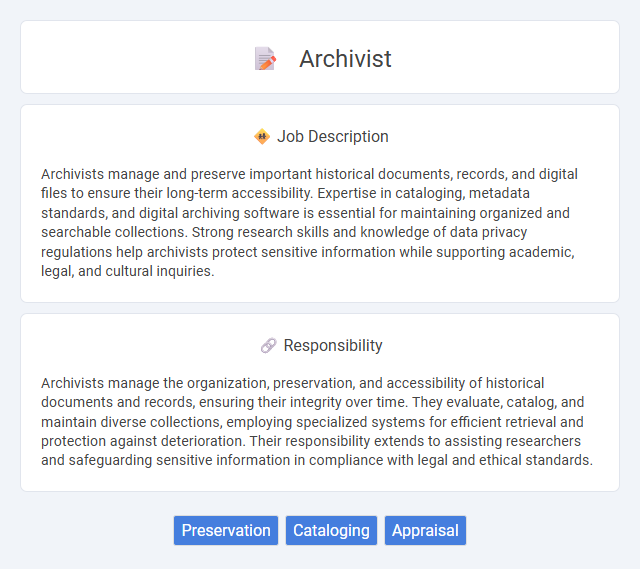
Archivists manage and preserve important historical documents, records, and digital files to ensure their long-term accessibility. Expertise in cataloging, metadata standards, and digital archiving software is essential for maintaining organized and searchable collections. Strong research skills and knowledge of data privacy regulations help archivists protect sensitive information while supporting academic, legal, and cultural inquiries.
Individuals with strong attention to detail and an interest in history or information management are likely suitable for the archivist role. Those who prefer organized, methodical tasks and work well independently may find this job fulfilling. People who struggle with prolonged focus or dislike administrative duties might face challenges in adapting to archivist responsibilities.
Qualification
Archivists typically require a master's degree in library science, archival studies, or history, with specialized training in records management and preservation methods. Strong knowledge of cataloging systems, digital archiving technologies, and legal regulations concerning information privacy is essential. Proficiency in metadata standards and experience with database management further enhance an archivist's ability to maintain and organize valuable historical and organizational records effectively.
Responsibility
Archivists manage the organization, preservation, and accessibility of historical documents and records, ensuring their integrity over time. They evaluate, catalog, and maintain diverse collections, employing specialized systems for efficient retrieval and protection against deterioration. Their responsibility extends to assisting researchers and safeguarding sensitive information in compliance with legal and ethical standards.
Benefit
Archivist jobs likely provide benefits such as preserving valuable historical documents and ensuring accessibility for future research. Professionals in this role often gain opportunities to work with diverse collections, enhancing their expertise in information management. The position may also offer a stable career path with potential growth in libraries, museums, and academic institutions.
Challenge
Archivist roles likely demand managing vast, complex collections of historical records, requiring meticulous attention to detail and strong organizational skills. The challenge of preserving and digitizing fragile materials might be significant, as well as ensuring accurate cataloging for future accessibility. Navigating evolving technologies and compliance with legal standards could also present ongoing difficulties in this field.
Career Advancement
Archivist careers offer significant opportunities for advancement through gaining expertise in digital asset management and preservation technologies, which are increasingly in demand in museums, libraries, and corporate sectors. Professionals who pursue specialized certifications in archival science or records management often move into leadership roles such as digital archivist, records manager, or archives director. Building skills in data analytics and metadata standards also enhances prospects for career growth in academic, governmental, and cultural heritage institutions.
Key Terms
Preservation
Archivists specialize in the preservation and management of historical documents, records, and valuable artifacts to ensure their longevity and accessibility for future generations. Utilizing advanced techniques such as digitization, climate-controlled storage, and restoration methods, archivists safeguard materials from decay, damage, and environmental threats. Expertise in metadata creation and archival standards enhances the organization and retrieval of preserved content, supporting research, cultural heritage, and institutional memory.
Cataloging
Archivists specializing in cataloging meticulously organize and classify historical documents, records, and artifacts to ensure easy retrieval and preservation. They employ metadata standards such as Dublin Core and MARC to create detailed, searchable catalog entries that enhance accessibility for researchers and institutions. Mastery of digital cataloging systems and archival software is essential for maintaining accurate and comprehensive archives that support long-term information management.
Appraisal
Archivists specialize in appraisal by evaluating records to determine their long-term historical, legal, or administrative value. They apply established criteria and standards to select materials for preservation, ensuring efficient management of archival collections. This appraisal process supports organizational compliance with retention schedules and facilitates meaningful access to valuable information.
 kuljobs.com
kuljobs.com